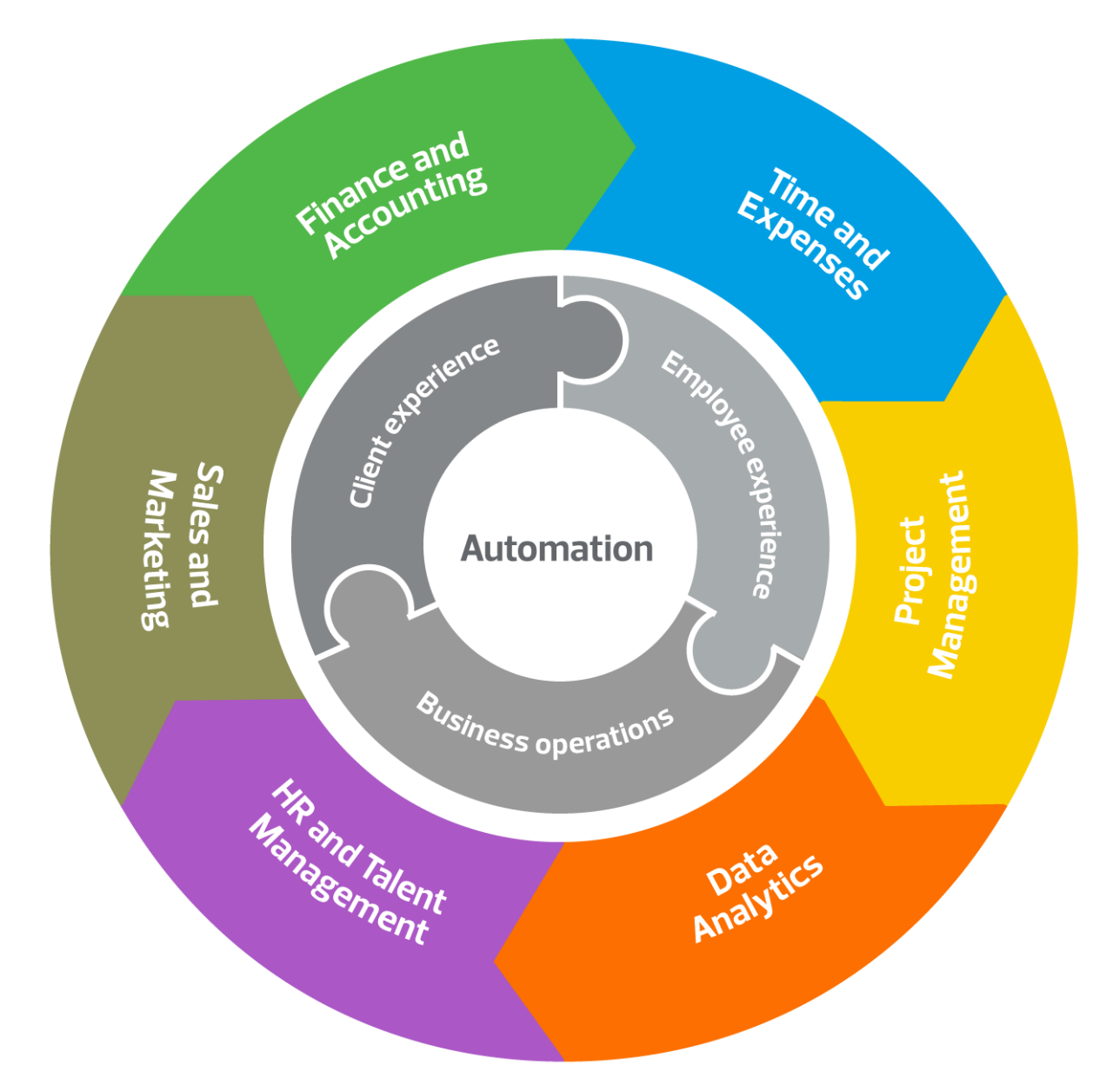BST & Co. | Accounting, Business Advisory, and Management Consulting
ARTICLE | June 18, 2023
Authored by RSM US LLP
In today's competitive and fast-paced business environment, automation is not just a buzzword—it's a necessity.
Business and professional services (BPS) firms face numerous challenges, including improving project profitability and margins, adapting to shifting customer expectations and reducing administrative tasks. BPS business models rely on individuals with specialized skills, expertise, and knowledge but often must optimize internal resources while working to acquire and retain talent.
Each of these hurdles can be addressed with automation, which can help firms improve operational efficiency, enhance service, and drive value for customers and employees.
Start with a holistic approach
Automation is often approached as a solution for a specific business problem. Business owners may adopt an automation platform to optimize one inefficient business function, such as a customer relationship management (CRM) system to improve client management or an accounting system to modernize financials. While these systems can lead to small improvements within a department, operating multiple siloed systems often increases inefficiencies and redundancies across the organization.
"When we talk about automation, we want to reduce or eliminate the disparate and unintegrated systems. Embracing automation can help you compete in today's market," says Karen Wiltgen, principal and national business and professional services consulting leader at RSM US LLP.
Rather than address inefficiencies symptomatically, businesses should take a holistic approach and strategically automate each business function so that all functions work together.
"A key focus should be developing a digital strategy that provides a three-to-five-year road map that outlines and creates a clear path aligning to your business strategic goals. To achieve the greatest value, determine the benchmarks to hit and the tactics that will lead you to success," Wiltgen says.
To build a fully effective automation solution, it's critical to evaluate the root cause of inefficiencies and address how each function of the business individually and in relation to others.
"When we talk about automation, we want to reduce or eliminate the disparate and unintegrated systems. Embracing automation can help you compete in today's market."
Karen Wiltgen, principal and national business and professional services consulting leader, RSM US LLP
Focus on value drivers
A digital solution that maximizes your overall business value will include significant transformations of the areas of your organization that drive the most value. These typically include your business operations, client experience and employee experience.

Automation of your business operations will primarily focus on improvements to your back office. An effective digital solution will go beyond automating your finance processes and updating your demand generation process; it should provide proactive client management, improve project margins, reduce the risk for over-budget and overdue projects, and expand your ability to secure strategic clients.
To deliver a seamless client experience across all channels of engagement, implement automation that reduces barriers and issues a client might encounter while engaging with the business. This strategy can save time and effort and boost client retention. Optimizing project operations can help you increase efficiency and manage resources, leading to improved business performance and profitability. This can improve time to value, increase the odds of a successful engagement and boost overall client satisfaction.
Automating to enable collaboration, increase project visibility across the business, and improve resource management enhances the employee experience, increasing talent retention, coordination and productivity.
Automate solutions across key business functions
A holistic automation transformation can improve the following critical business functions:
- Accounting. Reduce operational inefficiencies and administrative costs while improving the talent experience. Streamlining your billing and invoicing processes will reduce the need for manual data entry and ensure accurate and timely billing.
- Time and expense tracking. Enhance the employee experience and remove operational redundancies. An automated time and expense tracking system also reduces your risk of errors and increases project profitability.
- Project management. Improve the customer experience and streamline operations with a system that aids your talent around project management activities. Manage your projects and workflows more efficiently, improving project timelines, resource allocation and utilization, and overall project profitability.
- Data analytics and reporting. Enhance operational efficiency and reduce the need for manual data entry and analysis. Dashboards and reports can provide insights into client profitability, project profitability, and overall business performance more accurately and quickly.
- Sales and marketing. Improve business operations and the employee experience by saving time and resources. Automate lead generation, email campaigns, and social media posting to reach and engage target audiences effectively.
- Human resources and talent management. Optimize the employee experience and simplify administrative personnel tasks, including payroll. Achieve increased productivity and profitability by automating processes that enable you to hire and retain top talent.
Addressing these operational and process challenges through increased automation is critical for services organizations striving to maintain profitability, competitiveness and customer/client satisfaction. Organizations that look to automation to effectively face these challenges head-on are better positioned for long-term success.
This article was written by Karen Wiltgen and originally appeared on 2023-06-18. Reprinted with permission from RSM US LLP.
© 2024 RSM US LLP. All rights reserved. https://rsmus.com/insights/industries/business-services/automate-and-elevate-driving-business-value-to-new-heights.html
RSM US LLP is a limited liability partnership and the U.S. member firm of RSM International, a global network of independent assurance, tax and consulting firms. The member firms of RSM International collaborate to provide services to global clients, but are separate and distinct legal entities that cannot obligate each other. Each member firm is responsible only for its own acts and omissions, and not those of any other party. Visit rsmus.com/about for more information regarding RSM US LLP and RSM International.
Actively working together to make informed, confident decisions.
Filing for tax, ensuring financial stability, safeguarding from fraud, valuing your business for sale or litigation, complying with regulations, and managing investments and the day-to-day operations takes time, resources, and knowledge.
At BST, we partner with you to take the pressure off and deliver the most responsive, advanced, and innovative solutions. Our professionals include highly trained and experienced CPAs, MBAs, and financial advisors. We
are entrepreneurial and progressive thinkers looking out for your future. In addition to traditional accounting services, our solutions include business and asset valuation, forensic accounting, litigation support, wealth management, and outsourcing services for accounting, human resources, and marketing.
For more information on how BST & Co. can assist you, please call (518) 459-6700.

